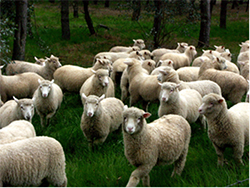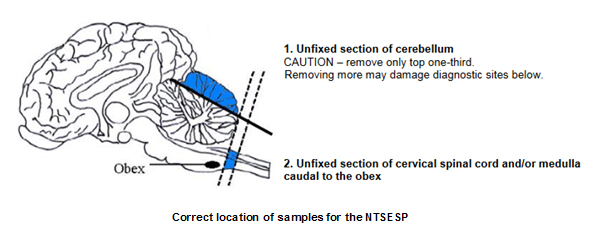Money for cattle and sheep brains
To enhance market confidence that Australian animals and animal products are free from transmissible spongiform encephalopathies (TSEs), Victoria, along with other states and territories, participates in the National TSE Surveillance Program (NTSESP).
Each year Australia is required to undertake TSE exclusion testing on a specified number of cattle and sheep with signs clinically consistent with either bovine spongiform encephalopathy (BSE) or scrapie. Incentive payments are available to both veterinarians and producers for the submission of brains from eligible cattle and sheep displaying clinical signs consistent with TSE.
Eligibility criteria
- Species – both cattle and sheep are eligible for payment (while scrapie can also occur in goats, they are not included in the NTSESP).
- Live examination – the animal must be examined while alive by the submitting veterinarian to independently establish the clinical state prior to euthanasia and sampling.
- Age – sheep must be 18 months of age or older (preferably less than five years); Cattle must be older than 30 months and less than nine years.
- Clinically consistent animal – the animal must have at least two clinical signs consistent with BSE or scrapie as per the Clinical history/necropsy report form (see the lists under 'Clinical signs consistent with scrapie').
- Sample type and quality – submitters must submit complete samples of the correct tissues (fixed brain, frozen 2 to 3cm of unfixed cervical spinal cord and section of the cerebellum) of diagnostic quality for TSE evaluation to a participating laboratory.

- Completion of required forms – each submission must include completed documentation as per the policy and procedures of the relevant agency including a completed laboratory submission form and clinical history/necropsy report
- 1 or 2 animals only per disease incident per property.
- Conflict of interest – the submitting veterinarian must not have an actual or perceived conflict of interest with the recipient of a payment arising from the NTSESP (for example, a financial or family link to them), or must satisfy the relevant state agency that a clinically consistent animal could not have been reasonably submitted by an alternative veterinarian without an actual or perceived conflict of interest.
Clinical signs consistent with scrapie or TSE
Animals are considered to be 'clinically consistent' if at least two of the following clinically signs are verified by examination of live sheep or cattle by an appropriate veterinarian.
Mental status:
- altered consciousness
- apprehension
- behaviour change
- frenzy
- moribund without evidence of infection or trauma
- temperament change
- teeth grinding
- nervous of entrance
- abnormal ear position
Sensation:
- blindness
- hyperaesthesia (sound, touch)
- hypoaesthesia (sound, touch)
- rubbing or itching
- wool loss (flank and hind quarter)
- head shyness
- excessive licking, flank licking
- kicking when milked
- pruritus
Posture and movement:
- abnormal head carriage
- ataxia
- circling
- falling
- fetlock knuckling
- paralysis or paresis
- recumbency
- tremor
More information about the program in Victoria can be found on VetSource.
More information on the NTSESP can be found at Animal Health Australia.
If you have cattle or sheep that fit the criteria, contact your local District Veterinary Officer for the relevant submission forms and approval.
Private veterinarians who are called to examine cases of nervous system disease in cattle and sheep, and submit samples and case histories to government laboratories can claim a rebate per case of up to $330 (GST inclusive) for cattle and $220 (GST inclusive) for sheep.
Producers who have eligible animals autopsied for the program are entitled to claim $300 (GST free) for cattle and $100 (GST free) for sheep.